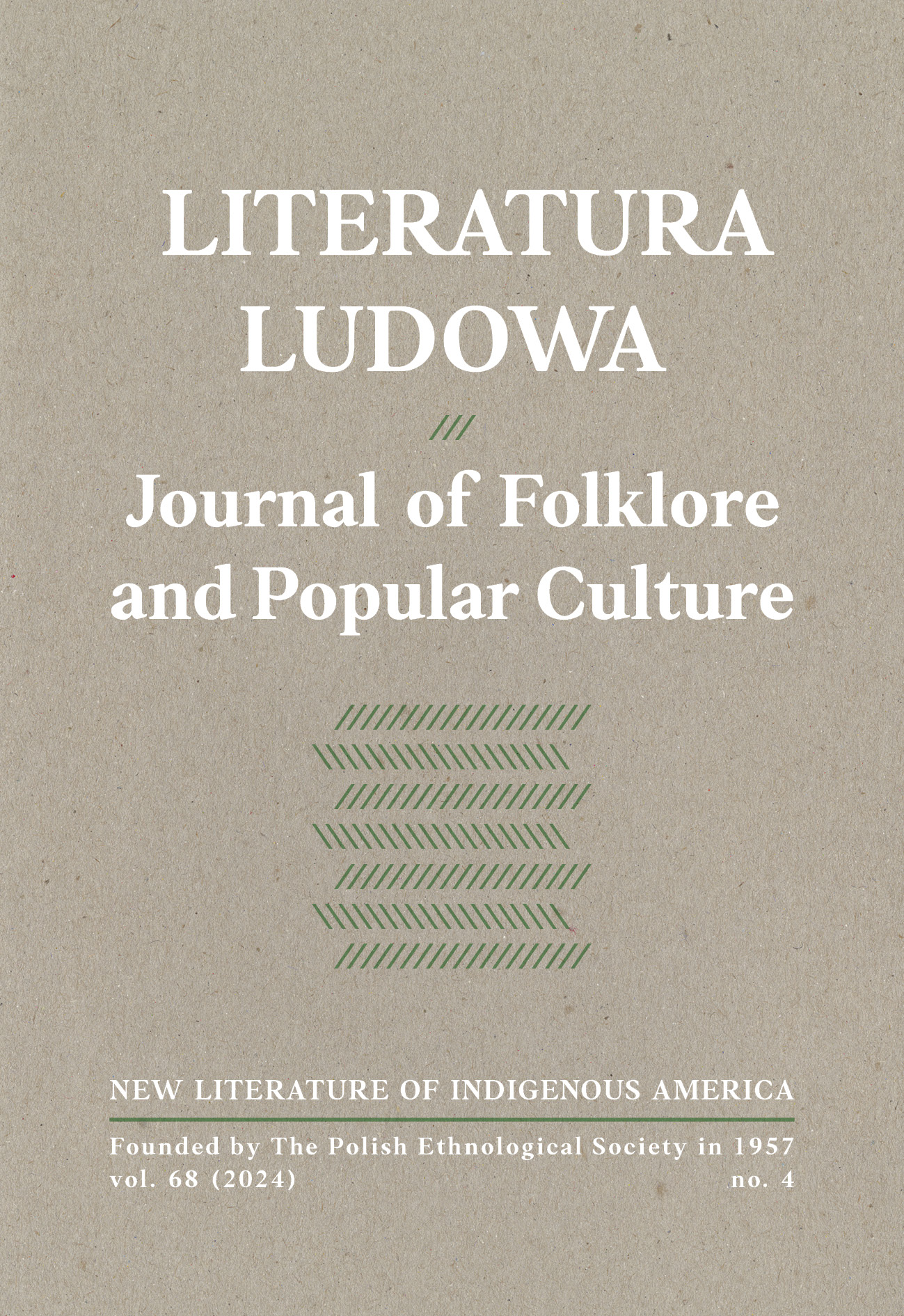Troska i humor we współczesnej literaturze tubylczoamerykańskiej. Lektury osobiste
DOI :
https://doi.org/10.12775/LL.4.2024.007Mots-clés
literatura tubylczoamerykańska, troska, humor, antropologia literaturyRésumé
Literatura pisana przez pisarki i pisarzy wywodzących się z tubylczych społeczności Stanów Zjednoczonych i Kanady nie może dziś ograniczać się do zbiorów nostalgicznej poezji, antologii wzniosłych przemówień czy malowniczych wyborów mitów i legend. Literatura ta porusza niemal wszystkie tematy typowe dla współczesnej sztuki słowa, niewątpliwie należącej do „światowej republiki literatury”. Tezą artykułu jest to, że można wskazać dwa wyraźne – istotne także dla odbiorców zewnętrznych – tematy dla tego pisarstwa. Są to: głęboko przeżywana troska o środowisko oraz specyficzne poczucie humoru. Teza ta została zilustrowana przykładami prozy i poezji Natalie Diaz, Inés Hernández-Ávili, Thomasa Kinga, Tomsona Highwaya i Adama Fortunate’a Eagle’a. Ich prace wykraczają poza schematy obecne w większości realistycznej prozy i preferencje branży wydawniczej, prezentując inne, „organiczne” spojrzenie na świat.
Références
Astley, N. (ed.) (2020). Staying Human. Poems for Staying Alive. Bloodaxe Books Ltd.
Atalay, S. (2012). Community-based archaeology: research with, by, and for indigenous and local communities. University of California Press.
Deloria, V. Jr. (1992). Foreword. In A. Fortunate Eagle, Alcatraz, Alcatraz! The Indian Occupation of 1969–1971. Heydey Books.
Diaz, N. (2018). The First Water Is the Body. In H. E. Erdrich (ed.), New poets of native nations (pp. 99–105). Greywolf Press.
Erdrich, H. E. (ed.) (2018). New poets of native nations. Greywolf Press.
Fortunate Eagle, A. (2014). Scalping Columbus and Other Damn Indian Stories. Truths, Halftruths, and Outright Lies. University of Oklahoma Press.
Fortunate Eagle, A. (2023). Pipestone. Życie w szkole z internatem dla Indian (tłum. B. Hlebowicz). Tipi.
Fishkin, S. F. (2005). Crossroads of Cultures: The Transnational Turn in American Studies. American Quarterly, 57(1), 17–57.
Hernández-Ávila, I. (2023). En el jardín del espíritu—with my helper, Chámis. American Anthropologist, 125(3), 694–699.
Highway, T. (2022). Laughing with the Trickster. On Sex, Death, and Accordions. Anansi Press.
Jay, P. (2010). Global Matters. The Transnational Turn in Literary Studies. Cornell University Press.
Johnson, J. (2013). In conversation with Tomson Highway. Macleans. https://macleans.ca/culture/in-conversation-with-tomson-highway/
Kelly, C. R., Black, J. E. (eds.) (2018). Decolonizing Native American Rhetoric. Communicating Self-Determination. Peter Lang.
King, T. (2021). Indians on Vacation. A Novel. HarperCollins Publishers Ltd.
Kuligowski, W. (2020). Nowa poezja tubylczej Ameryki. Jaka rzeka płynie przez ciało NDN? Teksty Drugie, 5, 196–215.
LaPointe, S. t. (2022). Red Paint. The Ancestral Autobiography of a Coast Salish Punk. Counter Point.
McCaffrey, L. (2004). Fikcje teraźniejszości (tłum. A. Krawczyk-Łaskarzewska). W: A. Preis-Smith (red.), Kultura, tekst, ideologia. Dyskursy współczesnej amerykanistyki (s. 351–373). Universitas.
Mallon, F. E. (2011). Decolonizing Native Histories. Collaboration, Knowledge, and Language in the Americas (trans. G. McCormick). Duke University Press.
McKearney, P. (2020). Challenging Care: Professionally Not Knowing What Good Care Is. Anthropology and Humanism, 45(2), 223–232.
Propp, W. (2016). O komizmie i śmiechu (tłum. P. Knyż). Nomos.
Stevenson, L. (2014). Life beside Itself: Imagining Care in the Canadian Arctic. University of California Press.
Waziyatawin, A. W., Yellow Bird, M. (eds.) (2005). For Indigenous Eyes Only: A Decolonization Handbook. School for Advanced Research Press.
Waziyatawin, A. W., Yellow Bird, M. (eds.) (2012). For Indigenous Minds Only: A Decolonization Handbook. School for Advanced Research Press.
Téléchargements
Publié-e
Comment citer
Numéro
Rubrique
Licence
© Waldemar Kuligowski 2025

Cette œuvre est sous licence Creative Commons Attribution - Pas de Modification 4.0 International.
1. The authors give the publisher (Polish Ethnological Society) non-exclusive license to use the work in the following fields:a) recording of a Work / subject of a related copyright;
b) reproduction (multiplication) Work / subject of a related copyright in print and digital technique (ebook, audiobook);
c) marketing of units of reproduced Work / subject of a related copyright;
d) introduction of Work / object of related copyright to computer memory;
e) dissemination of the work in an electronic version in the formula of open access under the Creative Commons license (CC BY - ND 3.0).
2. The authors give the publisher the license free of charge.
3. The use of the work by publisher in the above mentioned aspects is not limited in time, quantitatively nor territorially.
Stats
Number of views and downloads: 375
Number of citations: 0



